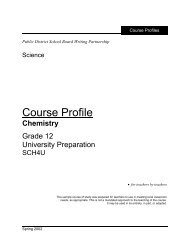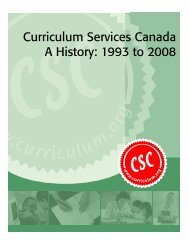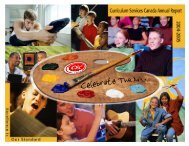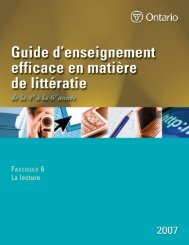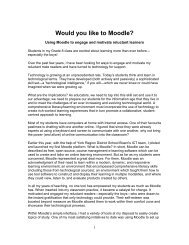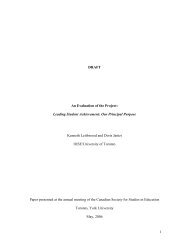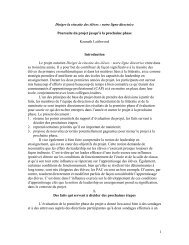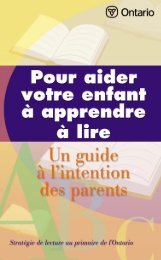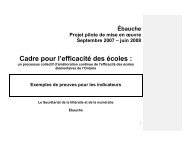Course Profile - Curriculum Services Canada
Course Profile - Curriculum Services Canada
Course Profile - Curriculum Services Canada
You also want an ePaper? Increase the reach of your titles
YUMPU automatically turns print PDFs into web optimized ePapers that Google loves.
Accommodations<br />
The course has been carefully crafted to meet the needs of a diversity of learners considering learning<br />
styles, multiple intelligences, and various religious and ethnic backgrounds. In addition, specific<br />
accommodations for students with exceptional learning needs have been suggested with each activity.<br />
Individual Education Plans for exceptional students provide teachers with specific learning strategies that<br />
work best with individual students. As well, the proficiency levels outlined in The Ontario <strong>Curriculum</strong>,<br />
Grades 9 to 12, English as a Second Language and English Literacy Development, 1999 provide teachers<br />
and school administrators with a guide to receiving and accommodating these learners in the regular<br />
classroom.<br />
There are a variety of strategies that can be used for students with special needs. Philosophy teachers are<br />
encouraged to work with the Special Education teacher to review students’ IEPs (Individual Education<br />
Plans) to decide the best course of action to assist them in meeting the expectations of the Grade 11<br />
Philosophy course. The variety of learning strategies and student performance tasks provide teachers<br />
with some guidance, but each individual student’s program will require appropriate accommodations<br />
based on the assessment and suggestions included in the IEP.<br />
Accommodations teachers should consider for students with learning disabilities are:<br />
• assess student reading comprehension level as early as possible to ensure proper accommodations are<br />
made;<br />
• allow for extra time to complete assignments;<br />
• provide visual cues;<br />
• provide ample scaffolding to assist students in generating and organizing ideas before completing<br />
tasks;<br />
• provide a glossary of terms for reference;<br />
• provide a vocabulary list to assist in the reading of assigned materials;<br />
• model skills for students when they are expected to draw inferences, make conclusions, or assess the<br />
implications of case study material;<br />
• make appropriate adjustments to performance tasks for students with visual impairments or with<br />
significant motor dysfunctions.<br />
There are many enrichment opportunities for students who wish to explore interdisciplinary connections,<br />
issues, and philosophical thought in greater detail.<br />
To ensure all students are able to be successful at meeting the expectations of the Philosophy course, it is<br />
strongly recommended that teachers use secondary sources to introduce and explain the ideas of<br />
philosophers. Generally, primary readings intimidate and overwhelm most students at the Grade 11 level.<br />
Gifted students may want to tackle some of the primary readings relating to issues be addressed in the<br />
course. Also, students need to be encouraged to respond to issues, ideas, and philosophies in a variety of<br />
ways, including written work, music, visual art, oral debate, and discussion. The use of the Multiple<br />
Intelligence-based Philosopher’s Journal is designed to help facilitate this. Teachers should use judicious<br />
and professional judgement when determining student success at meeting expectations. For instance, a<br />
student who demonstrates, through visual arts and discussion, a sound understanding of the issues, but is<br />
unable to express this understanding in written form, should be deemed to have met the expectations.<br />
Obviously, a balance of written and non-written work will need to be maintained but this balance does<br />
not have to be identical for all students, as long as they are meeting the expectations. Finally, in addition<br />
to the use of secondary sources, it is strongly recommended that teachers make use of popular media,<br />
such as music, movies, games, magazines, and newspapers, as vehicles into issues. By drawing on<br />
popular media, teachers can tap into the student’s world and explore profound and timeless issues<br />
grounded in student experiences.<br />
Page 15<br />
• Philosophy: The Big Questions - Open



